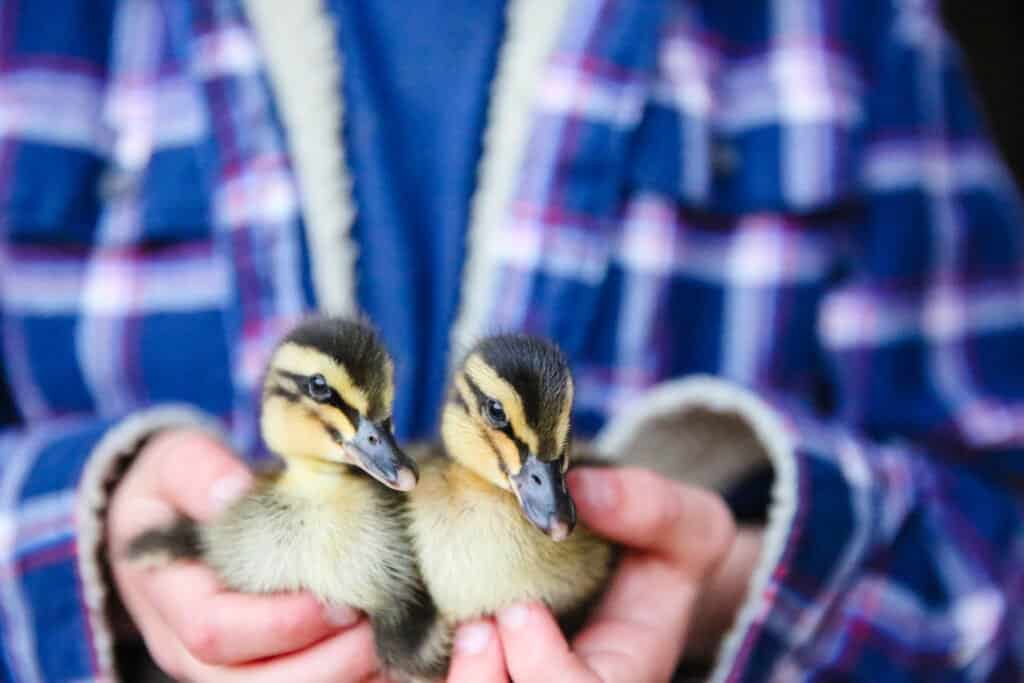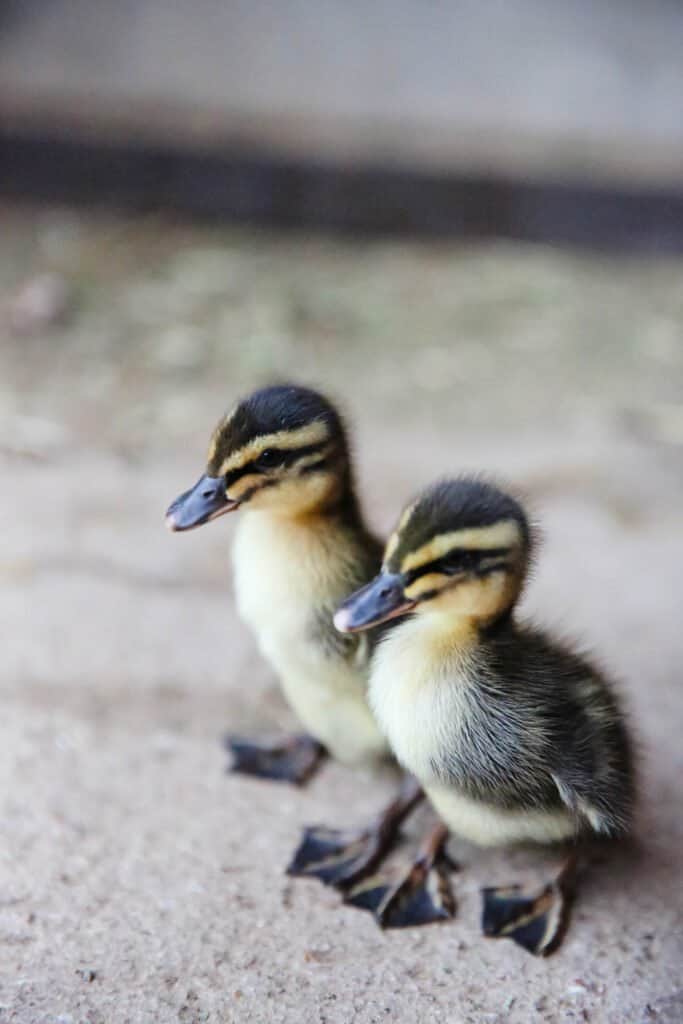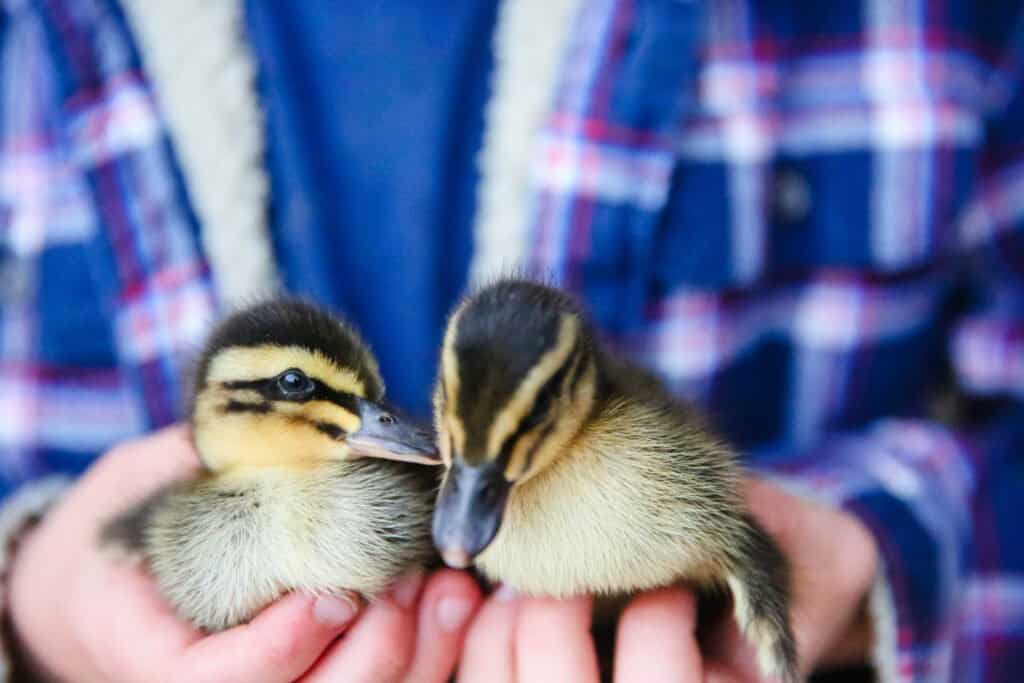What do Baby Ducks eat?
If you’re just getting started raising ducks, you may find yourself wondering what do baby ducks eat? This post provides all of the information you need when it comes to feeding and raising your baby ducklings.

Have you ever held a baby duck in your hands?! Oh my if you haven’t then you are missing out! First of all you need to go do that right now, and then continue to read.
I promise you, once you hold those little ducklings (or let your kids hold them), you will fall in love, and then you will need to read this post to know how to care for those baby ducks!

Ok, now that you are back and have cuddled those little ducklings, let’s talk about the most important part in caring for these adorable ducklings–feeding them. If you are like me, you are already busy feeding your crew of kids, so why would you want to add in feeding baby ducklings?! I’ll tell you why, because it is so stinking easy!
As you know, we have raised baby chicks before, and baby ducks (whether wild ducklings or domestic ducks) are very similar. What baby ducks eat is super simple. These eventual backyard ducks will be low maintenance, and will grow into free range eaters—if only our kids ended up this way!
Let’s jump into some helpful ideas from what you should and should not feed your baby ducklings to why it is worth raising and investing in these barnyard animals! From experience, I have learned a few tips and tricks to best care for these fluffy little friends.

What can I feed a baby duck?
You can feed baby ducklings many things. Baby ducks can eat healthy treats such as dandelion greens, chopped grass and weeds, meal worms, small insects, Swiss chard, kale, peas, other leafy greens, and even moistened oatmeal are all favorites of growing ducklings. Be sure that the grass and weeds are untreated.
But to start, we must teach ducklings to eat healthy, and not just eat those treats, right?!
There are ways to help new ducklings have a good start to their diet. Your goal is to provide healthy food so you have healthy ducklings that thrive the first weeks of their lives. If the mother duck is not around, it is up to you to step in and provide the next best option for a balanced diet.
To meet the nutritional needs of baby ducks during their first days, you can simply start with a fresh water bowl, clean water, and a scheduled feeding time (so you can remember to feed them consistently because they eat a lot!) at the beginning. Often times at a feed store, you can find chick starter feed that can be helpful as you begin to nourish these young ducklings.
Unlike chicks, ducklings need an extra Vitamin B for their bones and bills to grow correctly. If they are without it, your ducklings might end up with crooked legs and/or bills that curve up and do not close correctly.
Most duckling feed on the market contains that extra boost of Vitamin B that they need, but if you don’t want to buy extra feed, you can purchase chick starter and easily add extra niacin to their diet with brewer’s yeast. Just mix it with the starter feed – 1 pound of brewer’s yeast per 40 pound bag of chick starter is fine.
The important thing to remember is ducklings should only be on chick or duck starter feed for the first two weeks of age (as opposed to eight weeks for chicks), and then switched to the lower-protein content feed until they are about 18 weeks old. Then at 18 weeks, they can switch to the layer feed and eventually be integrated into a flock of adult ducks.

How much and how often?
Did you know that baby ducklings digest food quickly? Because of this they need food often. When you are feeding young ducklings, allow them to eat free choice, which means making food always available.
You want to make sure you are giving your baby ducklings opportunity to eat often because they are growing so fast! At the very least, feed ducklings three times a day intentionally. Particularly if you are wanting a schedule.
It’s fine to have dedicated feeding times for adult ducks, but it is not needed necessarily for ducklings. Ducklings need the availability to eat when they get hungry (kind of sounds like some kids I know who are always growing), so don’t worry about them overeating at this stage.
Your job is to make sure they always have access to food or are fed multiple times a day if you prefer a schedule. Feeding baby ducklings is a great way to get your kids involved in responsibilities and caring for other living things.
I can tell you that my kids are so anxious to care for these baby ducklings, that I have no probably handing over the feeding to them! It is a delight to be able to see my kids gain responsibility in caring so diligently for these animals! Plus, who does not want to snuggle a little baby duckling in between feedings?!

What fruits can baby ducks eat?
- Tomatoes (do not feed them the leaves because they are toxic)
- Pears (you can easily mash these up for them)
- Apples (be sure to mash a little bit so it is easier for the little ducks to eat- be sure not to allow them to eat the seeds)
- Bananas (mashed again, and be sure to avoid the peel- you can throw the peels in your compost!)
- Peaches (avoid the pit)
- Cherries (avoid the pit)
- Really most berries like strawberries, raspberries, blueberries, etc.
- Watch out for citrus fruits- you want to stay away from these as the acids from the citrus fruits can irritate their stomachs
What Vegetables can Baby Ducks Eat?
Did you know ducks don’t actually chew their food? Because of this you do not want long strands of grass or other foods getting caught up in their digestive system. Remember is important whether you are feeding young ducklings, older ducklings, or mature ducks.
- Cut grass (again be sure this grass has not been treated with chemicals)
- Kale (I like to make sure it is chopped up for easy digestion)
- Swiss Chard
- Radish and Turnip Greens
- Lettuces and other salad greens
- Cucumber
- Peas

What Not to Feed
Because ducks do not chew their food, they have a hard time digesting nuts and large seeds well. These can also cause choking or get stuck in the crop, so it is best to avoid these foods.
There are also some toxic flowers and weeds to be aware of as your ducks wander your property. Some of these include buttercup, daffodil, iris, lilies, lily of the valley, lupine, poppies, sweet peas and tulips.
Again, most weeds and herbs are safe for your ducks to eat, but milkweed, pennyroyal and vetch can all be toxic, so watch out for those!
I know we all think bread is a duck’s favorite since we grew up going to ponds and feeding the ducks our leftover bread. But, bread and crackers hold no nutritional value for ducks, so really if you can avoid it, it’s probably best.
How do you take care of baby ducklings?
Raising ducklings can be such a fun adventure, but you do need to be careful because you can easily lose these sweet babies to cold.
Though baby ducklings are born with down, they need to be kept warm until fully feathered. If they are the wild, they have their mother’s protection to keep them safe and warm which helps regulate their body heat. Their mother is the source of their warmth.
When you raise ducklings, you become their “mother” or their source of warmth. You will want to use a heat lamp or heat plate to keep them warm, usually only between two and six weeks, depending on the weather and how quickly they develop feathers. Luckily, baby ducks grow quickly!
Ducklings need to be warmed with heat from the first day at 90°F for the first week. Then you can decreased the temperature by about one degree a day after that until they are acclimated to the outside nighttime air temperature and are fully feathered out.
I like to suggest putting the heating source at one end of your brooder (container you are housing the baby ducks in). This way the ducklings can move toward or away from the heat source as needed.
I also find it super helpful to check the temperature of your heat source! You don’t want to go in and find that your warmer is actually too warm or too cold. If the ducklings are huddled under the warmer it could be a sign that it may not be warm enough, and if they can’t get far enough away from it, the warmer may be too warm.
Why do people raise baby ducklings?
In the past few years, more and more people are choosing to raise their own animals, ducks being one of them. Do not be fooled, they are an animal and all animals take responsibility and care! But I have found so much joy in raising ducklings, I think you will too!
Ducks are good at searching wildly for food themselves, and can obtain a large portion of their food from just that. They do not require a lot, and can can easily be found finding their own food. Yes, please!
Ducks can also benefit your family garden if you happen to have one. They provide high nitrogen fertilizer and help control grasshoppers, snails, slugs, potato beetles, Japanese beetle larvae, and other pests. Again, yes, please!

Is it hard to raise baby ducks?
Like all animals, or humans, it does take responsibility and work to care for them! Nothing really is easy at first, but after a few rounds of baby ducks (and maybe even kids!) it gets easier, and you are more familiar with the routine of caring for them.
In the beginning, caring for baby ducks takes some intentionality as you are making sure they are getting the warm, water, and nutrition they need as growing little ducks.
But once they grow, (which have I mentioned how fast they grow?!) they do become a little more independent, and caring for them is not as tedious.
Be sure to check out my post on How to Raise Baby Ducks for more step by step ways to help with this process!
Is it Worth Raising Ducks?
From experience, I can say right away, yes! It is worth raising ducks! Whether you intend to have a pet duck, or ducks adding to the health of your garden and open space, it is worth the time and investment.
Did you know you can eat duck eggs just like you do chicken eggs? And, duck eggs are not only more healthy for you than chicken eggs, but they are also bigger! Plus they are quite tasty–have you tried them?!
Like a lot of animals we raise, we love to know what we are feeding our animals–what is going in them. What goes in our ducks, goes in us eventually through their eggs, so the knowledge of knowing what we are putting in our bodies through the animals we raise, is so comforting!
I also love how much more gentle ducks are with my kids than chickens. Ducks tend to be social animals, so often I will find them following the kids or me around the yard! It is the funniest thing!
Compared to a lot of other barnyard animals, ducks actually get few diseases and parasites, making them a little less high maintenance when it comes to their health bill!
My favorite thing about raising ducks, and one reason why I think it is worth it, is because ducks are just plain fun! They do the strangest things and really are just funny animals. No need for Animal Planet on the television for the kids because they get so much entertainment in just watching and interacting with these fun pets on a daily basis!

Extra Tips
Here are a few tips I have learned over the years of raising ducklings!
Do check the law and make sure your area allows you to raise and keep ducks! It would be shame to fall in love and take the time caring for these little fluff balls, only to find out that you are not allowed in your area to house them!
It’s always a good idea to offer high protein treats. If you want to give your baby ducks something besides their feed to eat, try dried insects such as black soldier fly larvae or dried shrimp which are a favorite!
Ducks love dried shrimp. Because the dried shrimp float on water and are easily digested they make a perfect high protein snack! And, ducks actually enjoy filtering through their water to snap them up. It is a win win if you ask me!
Float treats or snacks. Remember ducks aren’t chickens – they have round bills and cannot pick things up as easily off the ground So, to help them, it’s best to float the treats on water so your ducklings can easily dig them up. Plus remember they enjoy this little challenge!
Having water available with their food is helpful because the water will help soften the food since they do not chew it up. Remember baby ducks require a lot of water in take at first, so be sure to keep that water clean and fresh!
So, next time you are at the feed store and you see those little ducklings under the warmer, you might just think again about grabbing a few and trying your hand at raising those little ducklings! If you already have a nice open space, a garden, and available willing little hands, it might be a sign to try mothering some little ducklings!
Be sure to reach out and let me know how your first round of duckling raising goes! Or if you are an experienced duck raiser, I would love to know your thoughts on raising and feeding baby ducklings! Learning from others is such a treat because I know there are always more to learn about raising animals!





